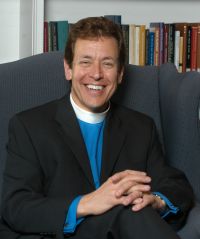 The Reverend Canon Dr. Frederick W. Schmidt, Jr. is an Episcopal Priest, Director of Spiritual Formation and Anglican Studies and Associate Professor of Christian Spirituality at Perkins School of Theology at Southern Methodist University. Previously he served as Canon Educator, Director of Programs in Spirituality and Religious Education, and Acting Program Area Manager at Washington National Cathedral. He is the author of seven books as well as numerous scholarly articles and book chapters. For more information, visit his faculty page or his website.
The Reverend Canon Dr. Frederick W. Schmidt, Jr. is an Episcopal Priest, Director of Spiritual Formation and Anglican Studies and Associate Professor of Christian Spirituality at Perkins School of Theology at Southern Methodist University. Previously he served as Canon Educator, Director of Programs in Spirituality and Religious Education, and Acting Program Area Manager at Washington National Cathedral. He is the author of seven books as well as numerous scholarly articles and book chapters. For more information, visit his faculty page or his website.
Earlier this week he wrote “Leading by Letting Go,” which is a must read for any mainline church led primarily by baby boomers . Schmidt suggests that it isn’t the age of the leaders that is the problem, but rather their mindset. He writes:
I love them, but sit with a group of church folk and what you often hear from boomers is the language that resurrects old divides, old causes, and really old grudges. The lines drawn during the gender, race, and orientation wars are the commonplace of such discussions, as is the language of old party politics.
What’s wrong with that? Aren’t these important issues? Don’t we need to go on fighting the good fight? Doing justice? Well, yes. But not the way it was once fought and not in the same places or the same ways.
Times have changed—thankfully. And the issues that were at the forefront of our battles are not the issues that our children face . . . There is no way to prove it, but I’m inclined to think that most young people are disenchanted with the mainline church because they are quite simply bored with our decades-long rant. “So, they have left the building.”
So What?
The way forward isn’t reliving the past; it is about a generation assuming a new role. In Schmidt’s words:
Leadership is about building, changing, and innovation. But it is also about letting go and the best leaders learn to let go. They mentor. They find a way to include a new generation. They look forward to a time when they aren’t here any longer. They grasp that they are stewards of a gift. They let go. They let go of the reins. They let go of their agendas. They let go of their stories, listen, and learn.
In that sense, the leadership of letting go is a spiritual discipline, marked by the humility to grasp the limits of our strength and the limits of our vision. A spiritual frame of mind that grasps, “It’s not all about us.” It’s all about God and God’s next generation of children. They will need to set their own agendas, do their own building, and in time, lead by letting go.
Think about the makeup of your local congregation and its leadership structures:
- What percentage of those active in the congregation are baby boomers (those born from 1946 to 1964)? What percentage of your congregation’s positional leaders are boomers or members of previous generations (i.e. silent or greatest)?
- How freely do all of these older generations welcome younger generations (i.e. X and Y) into leadership and empower them to make substantive decisions? In general have these more mature leaders (boomer, silent, and greatest) remained focused on the big issues of the 60s, 70s and/or 80s or have they effectively learned to lead by letting go and mentoring the younger generations?
- If you are a boomer or a member of the silent or greatest generations, how would you rate yourself insofar as being one who has truly embraced leading by letting go?
The failure of older Christians to let go is one of the more notable contributing causes to the continuing decline of mainline denominations. Whether it is Presbyterian leaders stepping forward to declare the PCUSA “deathly ill,” the recognition of just how commonplace “antiquated leaders” are, or simply the statistical realities of decades of declining membership, it is clear that the mainline has been sidelined and will soon be silenced unless radical reform is undertaken. By empowering a new generation of leaders, congregations and denominations open themselves to new possibilities for growth and abundant life.